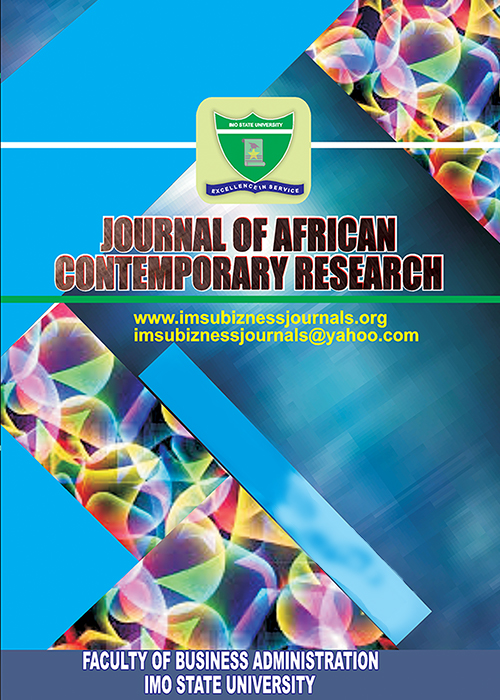FLIPPED CLASSROOM MODEL OF BLENDED LEARNING AND SENIOR SECONDARY SCHOOL STUDENTS’ PERFORMANCE IN ENGLISH LANGUAGE WRITING SKILLS IN RIVERS EAST SENATORIAL ZONE, RIVERS STATE
Abstract
This study was conducted to investigate flipped classroom model of blended learning and Senior Secondary School Students’ (SSI) Performance in English Language writing skills in Rivers East Senatorial Zone, Rivers State. Three objectives, three research questions and three hypotheses were formulated to guide the study. The research design used for this study was quasi-experimental research design. The population consisted of fifteen thousand eight hundred and twenty six (15,826) (SSI) students in public senior secondary schools in Rivers-East senatorial zone. A Sample size of eight hundred (800) students was used for the study. The instrument for data collection was English Language Performance Test on Writing (ELPTW), validated by two experts in English Language department. The reliability of the instrument was established with test retest method and the scores were correlated using Pearson Product Moment Correlation and a coefficient of 0.76 was obtained. Descriptive statistics mean and standard deviation was used to analyses the research questions while Analysis of Covariance (ANCOVA) was used to test the hypotheses at 0.05 level of significance. The results showed that the flipped classroom model of blended learning made the students at a posttest stage to have greater effect than the pretest stage in the use of English Language writing skills. There is significant difference in pretest posttest scores of students in flipped classroom model of blended learning made of the students at a posttest stage showed a greater effect than the pretest stage in the use of grammar, vocabulary, and punctuation. The study concluded that there is significant difference in the pretest posttest of flipped classroom blended learning and conventional method; hence the null hypothesis was rejected. Flipped classroom model leads to academic achievement because it encourages students’ engagement, boost collaboration among students and critical thinking ability in English language writing skills. It was recommended that: parents should encourage their children by providing enabling environment for study at home so as to attain to their assignments, task and online materials before the main classes at school, Ministry of education should share free computers and other electronic system as it brings good result in student's studying abilities and academic performance.
This article is available as a PDF download

Published in JOURNAL OF AFRICAN CONTEMPORARY RESEARCH
ISSN: 9783-7967
This article appears in our peer-reviewed academic journal
View JournalRelated Articles
Explore similar research in our collection
PERCEPTION OF MODERN FUNDING STRATEGIES AND SUSTAINABLE ENTREPRENEURSHIP AMONG THE YOUTHS IN OSOGBO, OSUN STATE
OWOLABI, SHERIFF ADESHINA, SALAMI, AKEEM OLARENWAJU PhD, AKINTAYO, AKINTUNDE AREMU, PhD, OYEKAN, MARVELLOUS ADETOLA
Nov 15, 2025
This article examines the Perception of Modern Funding Strategies and Sustainable , Entrepreneurship...
View ArticleRELATIONSHIP BETWEEN CONTINUOUS ASSESSMENT GRADE AND STUDENTS ACADEMIC PERFORMANCE GRADE IN CHEMISTRY EXAMINATION IN OGBIA LOCAL GOVERNMENT AREA, BAYELSA STATE
Akpomiemie Voke Lilian, Samuel O. Wagbara PhD
Mar 26, 2025
The study investigate the relationship between continuous assessment grade and students academic per...
View ArticleTHE CULTURAL IMPERATIVE: REENGINEERING WORK ATTITUDES FOR FUTURE-READY ORGANIZATIONS IN NIGERIA
JAKPA, GRACE UFUOMA
Mar 24, 2025
In an increasingly unstable global environment, preparing organizations for the future is a crucial ...
View Article